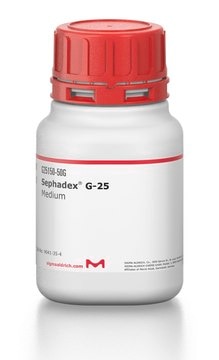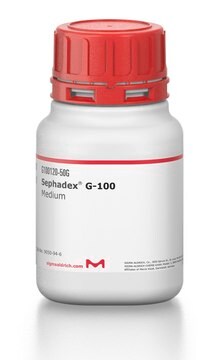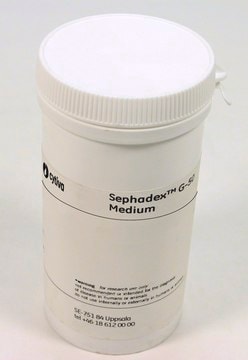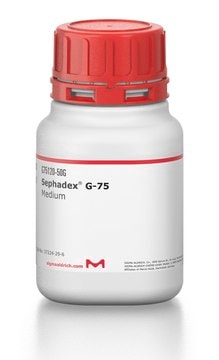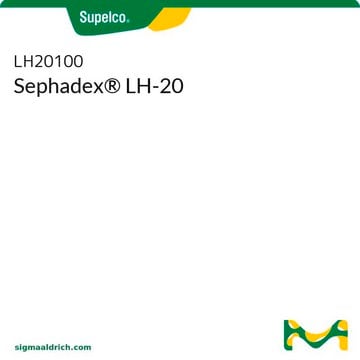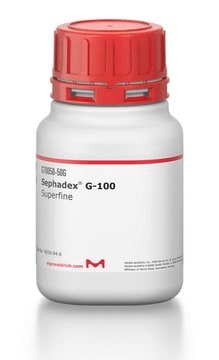G5080
Sephadex® G-50
Fine
Sinónimos:
Gel filtration resin, Sephadex G-50 Fine Medium
Iniciar sesiónpara Ver la Fijación de precios por contrato y de la organización
About This Item
Productos recomendados
technique(s)
affinity chromatography: suitable
matrix active group
phase
swelling
1 g swells to 9-11 mL
bead size
20-80 μm
application(s)
life science and biopharma
compatibility
Cytiva
General description
Sephadex G-50 Fine is a widely used gel filtration resin designed for desalting and buffer exchange of biomolecules with a molecular weight greater than 30,000. Its small bead size contributes to higher efficiency in these processes. Different types of Sephadex vary in terms of cross-linking, resulting in differences in swelling and molecular fractionation range. Sephadex G-50 is one of five G-types available, ranging from G-10 for small molecules to G-75 for larger molecules. Sephadex G-50 comes in four different particle sizes, such as Coarse, Medium, Fine, and Superfine.
Sephadex® G-50 is a gel filtration medium used in affinity chromatography, protein chromatography, and gel filtration chromatography. Sephadex is a beaded gel prepared by crosslinking dextran with epichlorohydrin.
Fractionation Range (MW)
Globular Proteins: 1,500 - 30,000
Dextrans: 500 - 10,000
Fractionation Range (MW)
Globular Proteins: 1,500 - 30,000
Dextrans: 500 - 10,000
Application
Sephadex® G-50 has been used:
- to remove the non-entrapped carboxyfluorescein (CF) from the liposome suspension
- in the purification of monoclonal antibody (mAb) humanized MN-14 by centrifuged size-exclusion chromatography
- in desalting the recombinant enzymes eluted in the fraction five and six
Sephadex® G-50 is suitable for use in:
- the separation of low and high molecular weight molecules
- affinity chromatography, protein chromatography, and gel filtration chromatography
Features and Benefits
- Desalts, removes contaminants, and transfers to a new buffer in one step.
- Suitable for DNA purification from small molecules using gel filtration.
- Features a small bead size, resulting in shorter diffusion distances.
- Considered a classic gel filtration resin.
- Desalting with Sephadex is considered superior to dialysis because it saves time, has a low dilution factor, and recovers high activity even with minute amounts of sample
Other Notes
G5080-100G′s updated product number is GE17-0042-01
G5080-500G′s updated product number is GE17-0042-02
G5080-500G′s updated product number is GE17-0042-02
Legal Information
Sephadex is a registered trademark of Cytiva
replaced by
Referencia del producto
Descripción
Precios
Storage Class
11 - Combustible Solids
wgk_germany
WGK 3
flash_point_f
Not applicable
flash_point_c
Not applicable
ppe
Eyeshields, Gloves, type N95 (US)
Certificados de análisis (COA)
Busque Certificados de análisis (COA) introduciendo el número de lote del producto. Los números de lote se encuentran en la etiqueta del producto después de las palabras «Lot» o «Batch»
¿Ya tiene este producto?
Encuentre la documentación para los productos que ha comprado recientemente en la Biblioteca de documentos.
Los clientes también vieron
Relaxation of tyrosine pathway regulation underlies the evolution of betalain pigmentation in Caryophyllales
Lopez-Nieves S, et al.
The New phytologist, 217, 896-908 (2018)
L Zhang et al.
The EMBO journal, 14(2), 313-320 (1995-01-16)
Heme is a prosthetic group for numerous enzymes, cytochromes and globins, and it binds tightly, sometimes covalently, to these proteins. Interestingly, heme also potentiates binding of the yeast transcriptional activator HAP1 to DNA and inhibits mitochondrial import of the mammalian
L M Weiner et al.
Journal of immunology (Baltimore, Md. : 1950), 151(5), 2877-2886 (1993-09-01)
Bispecific monoclonal antibodies (BsmAb) with specificity for tumor Ag and effector cell trigger molecules have been shown to redirect the cytotoxicity of several peripheral blood mononuclear cell populations against relevant tumor. The BsmAb, 2B1, binds to the extracellular domain of
Clinical-scale radiolabeling of a humanized anticarcinoembryonic antigen monoclonal antibody, hMN-14, with residualizing 131I for use in radioimmunotherapy
Govindan SV, et al.
Journal of Nuclear Medicine, 46(1), 153-159 (2005)
Samuel Lopez-Nieves et al.
The New phytologist, 217(2), 896-908 (2017-10-11)
Diverse natural products are synthesized in plants by specialized metabolic enzymes, which are often lineage-specific and derived from gene duplication followed by functional divergence. However, little is known about the contribution of primary metabolism to the evolution of specialized metabolic
Nuestro equipo de científicos tiene experiencia en todas las áreas de investigación: Ciencias de la vida, Ciencia de los materiales, Síntesis química, Cromatografía, Analítica y muchas otras.
Póngase en contacto con el Servicio técnico

